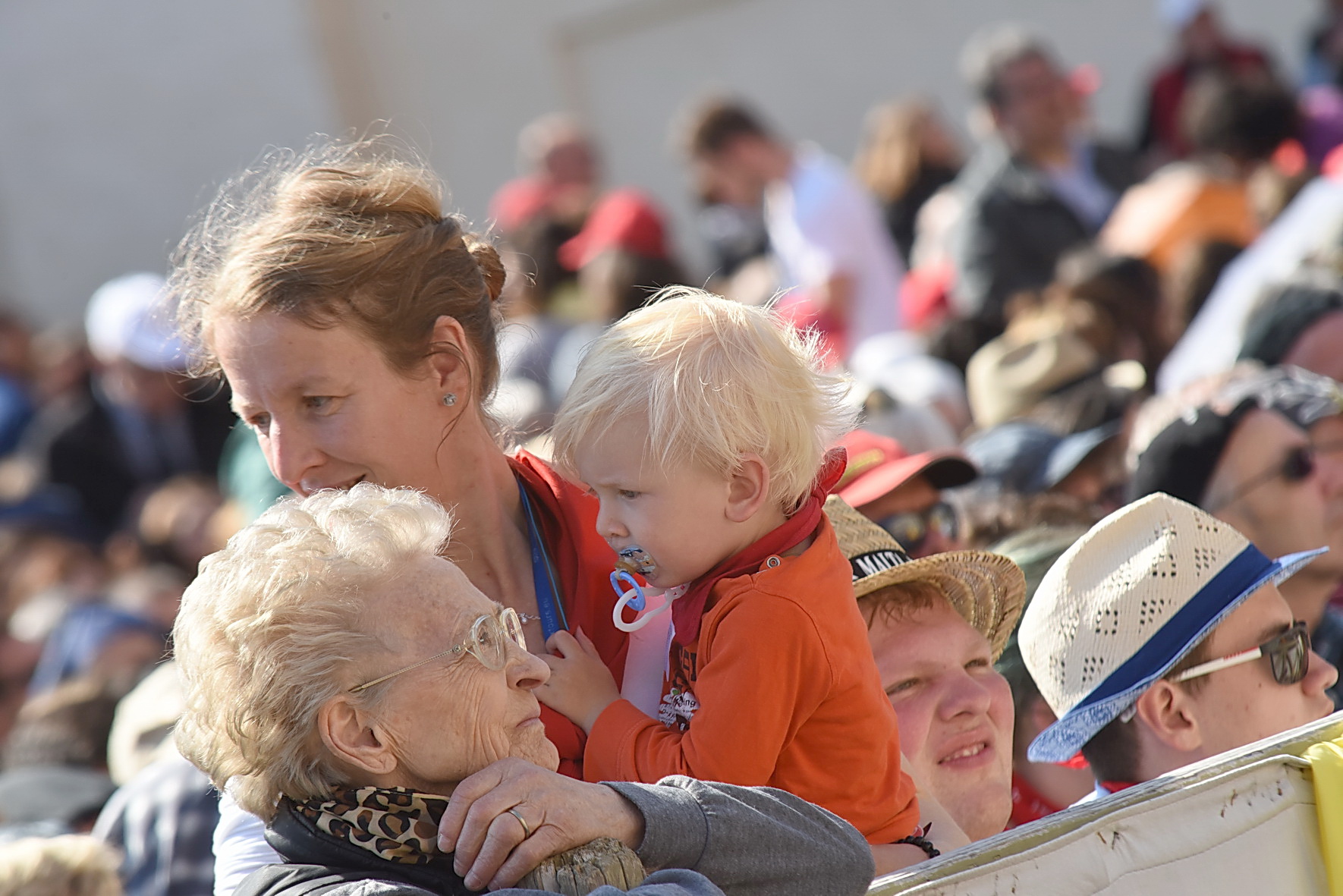The wisdom of time
“Sharing the wisdom of time”, the book featuring the Pope’s dialogue with Antonio Spadaro, “rereading” the stories of young and old people across the globe was presented in Rome today. An example for the Pope is “grandma Rosa”

“For some time, I have been cherishing a thought inside my heart. I feel that this is what the Lord wants me to say: that there is an alliance between the young and the old. This is the time when grandparents must dream, so young people will see visions.” These are the opening phrases written by Pope Francis for the book “The wisdom of time”, edited by Father Antonio Spadaro, which will be presented in the afternoon at the Augustinianum Institute in Rome where the Pope will dialogue with some young people, with a group of elderly people and with a special guest: film director Martin Scorsese. To the elderly – who thus created a neologism – the Pope’s request is be “memorious of history.” His request to the young is “to gaze into the starts, with a sound spirit of utopia that pools energies for a better world.” Francis takes grandma Rosa as an example: “She was stripped of her affection many times, but she kept her gaze fixed on high. He said few, extremely simple things. She gave little advice, but she reflected and prayed profusely”, revealed the author of the book. In this concerted editorial effort of words and pictures, the Pope reads and comments the individual stories, in dialogue with the editor-in-chief of the magazine “La civiltà cattolica”. The stories collected in the volume – published in Italy by Marsilio Editori – are a broad selection of 250 interviews to old people carried out by a group of publishers coordinated by the American publishing house Loyola Press, with the support of the non-profit organization Unbound and JRS, the Jesuit Refugee Service. The initiative forms part of the global project Sharing the Wisdom Of Time.
 Life is a composition. “Our life is not part of a film in which all the scenes have already been written.” In his reply to Oscar winner Martin Scorsese, who mentioned the many failures he had to face before accomplishing his professional dream, the Pope uses a cinematographic language: “Life is an adventure which we must embark on. A director perhaps is more aware of this. We must let ourselves go to the encounter with life and with God, Who sometimes surprises us with a sudden intuition.
Life is a composition. “Our life is not part of a film in which all the scenes have already been written.” In his reply to Oscar winner Martin Scorsese, who mentioned the many failures he had to face before accomplishing his professional dream, the Pope uses a cinematographic language: “Life is an adventure which we must embark on. A director perhaps is more aware of this. We must let ourselves go to the encounter with life and with God, Who sometimes surprises us with a sudden intuition.
We shan’t be stopped by failure if we have the fire in our heart. None of those who tells us ‘you are worth nothing’ will ever stop us. There are opportunities and inspirations that make you progress in your vocation. There are opportunities and there are mistakes. Life is a result of a mixture of all this, a mixture that the elderly have deep knowledge of.”
Making history. “Young people with no time to listen to the elderly or who avoid them do so because they have no sense of history”, Francis said commenting on the experience of Yenifer Tatiana Valencia Morales, coordinator of Unbound in Colombia, who experiences the importance of intergenerational understanding on a daily basis. “Making history is not the same thing as surviving!”, the Pope said.
“God walks in the personal history of many people, of many sinners. God is not ashamed to walk in the history of so many sinners, He is not ashamed of His people. Not wanting to make history is a parasitic attitude.” God’s arrases. Italian mother and grandmother Maria Gabriella Perin retraced her life comparing it to an arras whose broken threads are re-woven by God, who reassembles them forming an unexpected and unpredictable design. “We live such complicated stories!”, Francis replies: ” The threads are intertwined and we sometimes fail to understand what is happening to us. But God looks at us with the eyes of the Creator and Artist, putting together our mistakes, our sins and our good deeds, as if they formed part of an arras. The old man’s gaze often senses what lies behind those tangled threads; it captures the shape and form.
Ever so often, mistakes are the raw materials of miracles.
Hypocrites are scandalized by the miracles that God makes with our mistakes. The hard-hearted are shocked and they want to prevent the miracle. It happens even today inside the Church.”
Clay vases. Those who mould from clay know that no vase is equal to another. It’s the case of Martin Benton, potter and retired lawyer, whose experience becomes for the Pope an opportunity to remind us that
“God does not love what is perfect and with no defects. He does not create things to discard them but to love them for what they are. God shapes and moulds the clay in his hands. Craftsmanship is the work of God, it’s the opposite of abstract, theological work that prescinds from reality.”
Romeo and Juliet. Janet Shaabo Mardelli is a grandmother who has lived with her husband in Syria for 52 years. They were renamed “Romeo and Juliet.” Everything changed after the death of the husband the outbreak of war. Now Janet faces a new crossroads full of unknowns. She will soon be arriving to Italy as asylum-seeker. Her husband’s words, carved in her mind and in her heart, are the food of her journey:
“Be always determined. Don’t cry for the present, do not let yourself be confused by the pros and the cons. Take brave decisions, on any aspect of life.” “In the confusion of the war some people have learned to be determined.” Francis’ homage: “Some people may be fragile, but they do not let themselves be paralysed by uncertainty, by fluctuating between ‘yes’ and ‘no’. They are capable of stripping themselves of all they have to save a life, a family, and memory.”